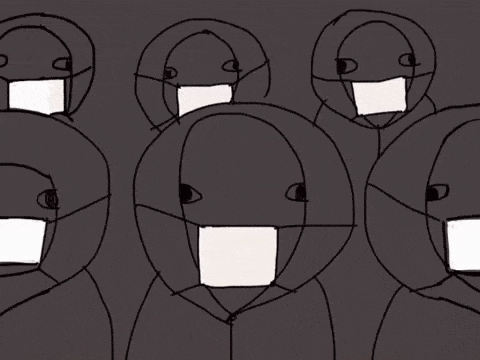Sign up for our weekly AI ethics newsletter to get the full-length version of this issue in your inbox every Monday!

GIF Credit: Barbara Pozzi
The lack of leadership by public institutions and governments on the spread of disease from the novel coronavirus (COVID-19) has led to open season on facts, especially on social media. To combat the misinformation and rampant speculation, we’ve curated the most credible sources on this global public health crisis.
We’ve excluded questionable takes from some leading voices in tech because we don’t agree with the popular notion in Silicon Valley that expertise in tech/data extends to expertise on all other issues. Right now we have limited data (and data of variable quality), which means that making predictions requires not just mathematical and technical understanding, but contextual knowledge of virology, epidemiology, and public health.
And as such, we refuse to use our platform to undermine the true experts in critical matters of public health and safety, which in this case are epidemiologists, virologists, doctors, scientists, and public health experts.
There is a middle ground between panicking and doing nothing, which includes taking precautions, planning, and preparing. Prevention is not glamorous and if done right, it will result in…gasp…no dramatic headlines! This is a hard lesson for a society that is addicted to a 24×7 news cycle. We are grateful to the heroes who sounded the alarm on this crisis and those who continue to put their lives at risk to keep the rest of humanity safe.
Many thanks to Ian Moura for curating and Maya Gota for pulling together this special issue. We hope you find these resources helpful.
Take a deep breath. This too shall pass.

Illustration: Toby Morris for The Spinoff
Facts and Only the Facts
After ‘Flatten the Curve’, we must now ‘Stop the Spread’.
You’ve probably seen the term “Flattening the curve” trending online. Dr Siouxsie Wiles, Associate Professor and head of the Bioluminescent Superbugs Lab at the University of Auckland explains what it means and steps we can all take to slow down the spread of coronavirus. This is part of the Spinoff’s ongoing expert-led, evidence-based coverage of Covid-19.
Clarity, Please, on the Coronavirus Statistics
Must-read explanation of the terminology used by media experts and how to ask smart questions about the information being thrown at you. For example: What is population mortality rate? What determines the “deadliness” of a disease?
Andrew Noymer on Twitter: “Why does Italy have more #COVID deaths than the Republic of Korea?”
Insightful twitter thread from Andrew Noymer (professor in the Public Health department at UC Irvine) demonstrating demographic differences contributing to greater mortality in Italy vs. South Korea.
The Coronavirus, by the Numbers (also includes answers to your most common questions)
“In thinking about social behavior and thinking about your interactions, the question should be, “How do we stop transmission getting into those groups where the impact could be really severe?”
WHO Expert: Aggressive Action Against Coronavirus Cuts Down On Spread
“Some countries have been very aggressive and have actually done quite a good job. Other countries have been quite lackadaisical and, I think, have suffered immensely from it.” BUT “Without testing, you have no idea how extensive the infection is. You can’t isolate people. You can’t do anything,”
Singapore Was Ready for Covid-19—Other Countries, Take Note
“After SARS and H1N1, Singapore built a robust system for tracking and containing epidemics. South Korea, Taiwan, and others did too—here’s what they learned.”
Research team has isolated the COVID-19 virus – Sunnybrook Research Institute
“The isolated virus will help researchers in Canada and across the world develop better diagnostic testing, treatments and vaccines, and gain a better understanding of SARS-CoV-2 biology, evolution and clinical shedding.”
Keep Calm and Communicate Responsibly
Why Asians in masks should not be the “face” of the coronavirus
“Kainaz Amaria, Vox’s visuals editor who has been recognized for her ethical practices within photojournalism, says the repeated use of these photos could add to the xenophobia Asians are already facing due to the outbreak.”
AI and Coronavirus
AI could help with the next pandemic—but not with this one
“The hype outstrips the reality. In fact, the narrative that has appeared in many news reports and breathless press releases—that AI is a powerful new weapon against diseases—is only partly true and risks becoming counterproductive.”
Coronavirus is the first big test for futuristic tech during a pandemic
“last year the Hong Kong government tried to ban wearing face masks in public assemblies in order to stifle pro-democracy protesters. Now, the Chinese government is urging manufacturers to boost production of masks, hoping to slow the coronavirus spread in China. ”
Helping yourself and others during this pandemic
Folding@home takes up the fight against COVID-19 / 2019-nCoV
h/t @AlaricAloor
“With many computers working towards the same goal, we aim to help develop a therapeutic remedy as quickly as possible. By downloading Folding@home here [LINK] and selecting to contribute to “Any Disease”, you can help provide us with the computational power required to tackle this problem.”
How to Help Others in the COVID-19 Crisis
“…many of the most vulnerable populations in the United States face stressors that extend beyond the immediate health concerns spurred by the global pandemic…Nevertheless, communities are stepping up to offer assistance to those in need right now, in an effort to fill the gaps. Here are a few ways you can help, too.”
Sign up for our weekly AI ethics newsletter to get this and other exclusive content delivered to your inbox every Monday!
